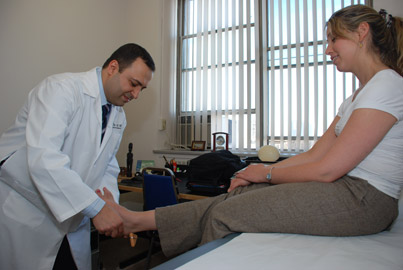A Rich History

1930’s: Hans Selye begins work on stress response. J.S.L. Browne and Elenor Venning discover progesterone and estrogen-related compounds regulating the menstrual cycle.
1940’s: J.B Collip first investigates properties of ACTH. C.P Leblond discovers radioactive iodine uptake by the thyroid.
1950’s: Beverly Pearson-Murphy discovers new methods for measuring steroid hormones.
1960’s: Sam Solomon’s research on estrogens assist in the development of conjugated equine estrogens. C. Scriver describes hereditary forms of rickets, initiates vitamin D supplementation to milk, as well as neonatal screening for hypothyroidism and other disorders.
1970’s: J. Maxwell Mackenzie identifies factors which cause overactivity of the thyroid gland. Barry Posner demonstrates that insulin binding to its receptor stimulates movement of the receptor into the cell.
1980’s: David Goltzman demonstrates that a hormone is responsible for malignancy-induced hypercalcemia. Yogesh Patel characterizes different forms of somatostatin – now used to treat many endocrine tumors.
1990’s: Hans Zingg demonstrates that steroid hormones act not only within cells, but also on cell membranes.
2007: Robert Sladek and Constantin Polychronakos identify new genes that predispose the development of diabetes.
Vast Clinical Exposure
A large, active clinical service that sees around 2,000 in-patient consultations and 50,000 out-patient visits annually. Almost all of these opportunites are available for resident teaching and represent a formidable resource with practically every variety of endocrine / metabolic problem covered.
Well-Honed Clinics
Well-developed subspecialty teaching clinics through which over two-thirds of ambulatory visits are processed, and which provide structured instruction in every area of out-patient endocrinology.

Unparallelled Technical Resources
Strong clinical laboratories on campus which have pioneered the development of several different hormone radioimmunoassays, and which currently provide a wide range of hormone assays needed to gain adequate endocrine profiling and complete a diagnostic work-up.

A Growing Network
Consolidation of the McGill University Health Centre (MUHC) hospitals, which has increased the communication between sites.
A good working relationship with our pediatric colleagues and colleagues from the Université de Montréal, which fosters greater interaction and collaboration at all levels.
An Accomplished Staff
A large number of strong academic staff, many of whom act as role models. The group includes both clinicians, physician scientists, as well as basic scientists. This mixture allows for ongoing integration between the clinical and basic aspects of endocrinology, which is carried out continuously at our Endocrine Rounds, Journal Clubs, and during case conferences and consultation reviews.

The presence of many internationally recognized basic research laboratories that provide varied opportunities for basic and clinical research during the research elective block. (see Program Overview and Staff)

World-Class Contacts
An active visiting professor program that brings our trainees in contact with world-renowned presenters and researchers on a regular basis.
Opportunities to Fine-Tune Teaching Skills
Several well-attended conferences and other forums where residents can hone their presentation skills in a fertile academic setting.

A Flexible Program With Multiple Possibilities
At the onset trainees choose the length of their Reproductive Endocrinology and Pediatric Endocrinology rotations, depending on their personal preferences and needs. The research elective block is completely tailorable in both its timing and composition, with project possibilities ranging from the most fundamental basic research to clinical trials and epidemiologic studies. Several trainees also elect to stay for an additional third year, either to further their research or to acquire supplementary clinical skills in a specific field of Endocrinology & Metabolism, such as diabetes and lipids, neuroendocrinology, reproductive endocrinology and others. Some trainees also extend their training to obtain additional academic recognition such as a Master’s degree in Clinical Epidemiology.
Financial and Other Support
Every trainee is awarded $300 at the onset of their training which goes towards the purchase of an endocrinology textbook. Additionally, $750 per year is provided to each trainee for attendance at endocrine meetings, and $1,000 is awarded to trainees who present at these meetings. In addition to unlimited conference leave, every trainee is allotted 7 days of study leave and 4 weeks of vacation each year. The province provides a 6-month maternity leave, as well as additional honoraria for taking call from home. The Endocrine Teaching Office provides assistance for the move to Montreal, and McGill University provides language classes at reduced rates for its trainees.
A Rich and Vibrant City

Montreal remains one of the most exciting and diverse cities in North America, and never ceases to surprise and amaze even its life-long inhabitants. It can satisfy the most adventurous visitors, yet also offers a safe and peaceful environment to young families with its parks, activities, and excellent schools.